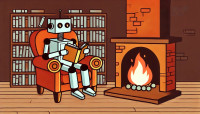
Has publishing abandoned teen boys?
thebookseller.com – Sunday October 20, 2024

Teen boys can be tempted back to books, but the industry needs to refocus its efforts.
Recently, I asked social media a question—are we ready to have the ‘there is nothing out there for teen boy readers’ discussion yet? What transpired on that thread was authors, booksellers, librarians, readers and parents all chiming in with fascinating responses. By far the most common was that there is a dearth of books for boys in the post-Middle Grade space.
Now, MG is filled with wonderful books for boys, but Teen and YA unquestionably lean towards girl readers. During my school talks all over this country, I’ve heard boys say: "I can never find a book I like" or, "Yours is the first book I’ve read in ages". You might think hearing that is nice, but more than anything it’s frustrating. Because it means publishing isn’t serving them in the way they deserve. And if this industry isn’t serving its young readers, particularly at a time when you either capture them for life or lose them forever, then change is desperately needed.
A crucial point made on the thread was that all Teen publishing is underserved. I agree, and there seems to be two key reasons for this. The first is that there is no industry-accepted term for children 13-16. ’Teen’ is a term that is sometimes used, but it’s by no means universally acknowledged. While some online retailers have a Teen and YA category, most brick-and-mortar bookshops have either a Teen or YA section, not both. Which means that a 15-year-old walking into a bookshop must make their way through countless books that are not written with them in mind before they find one that is. This is particularly true for teen boys, who are increasingly unlikely to find books for them on tables or face-out on shelves. Booksellers are well aware of this, and I’m convinced that it’s only with their knowledge and expertise that that boy would walk away with a book that is for him.

Lara Pawson: “I like to write with rules. It pushes my mind into strange places”
newstatesman.com – Sunday October 20, 2024

The Goldsmiths Prize-shortlisted author on making art from objects, and what civil wars taught her about human nature.
Lara Pawson was born in London in 1968 and studied politics at the School of Oriental and African Studies. Between 1996 and 2007, she worked as a journalist, mainly for the BBC World Service. She lived in Angola, Ivory Coast, Mali and Ghana, and travelled throughout Africa, before returning to London, where she now lives. Her first book In the Name of the People: Angola’s Forgotten Massacre was published in 2014, and her experiences as a reporter covering civil wars in Angola and Ivory Coast informed her “fragmentary memoir” This Is the Place to Be (2016).
Pawson’s third book, Spent Light – another fragmentary work – is a book of objects. From a toaster that recalls a story of horrifying violence heard on a bus ride in Andalucía to a brass door handle that retains the spirit of the east London ironmonger who made it, everything that meets the narrator’s eye connects to a personal memory or historical event, in a chain of shocking, funny, revelatory associations. “It is impossible to predict,” the Goldsmiths Prize judge Sara Baume wrote, “at the beginning of almost every paragraph of Spent Light, where it will have taken the reader by the end.”

4 Best-Selling Authors Share Their Best Advice for Finally Writing and Selling That Book Swimming Inside Your Head
entrepreneur.com – Saturday October 19, 2024

The hosts of the "Friends & Fiction" web series share hard-earned lessons they've learned living the writer's life.
"The Titanic was sinking so we jumped in the lifeboat and paddled like hell."
That's how New York Times bestselling author Mary Kay Andrews describes the origin of Friends & Fiction, the weekly web series she co-hosts with her best-selling writer pals Kristin Harmel, Kristy Woodson Harvey and Patti Callahan Henry. Every Wednesday night at 7 pm ET, they chat with authors like Jodi Picoult, Kwame Alexander, and Elin Hilderbrand about their latest works, their tips for writers, and the books they've read that shaped their careers.
In 2020, the four friends had their upcoming book tours abruptly canceled due to the pandemic. They hopped on a Zoom happy hour to commiserate over glasses of rosé and began strategizing best how to reach their readers and support independent bookstores while everyone was stuck at home. As the wine flowed, so did the ideas, eventually manifesting in their wildly popular Friends & Fiction YouTube show and podcast, as well as a Facebook community that has more than 240,000 members.
Since its inception, which featured former host Mary Alice Monroe, the show has branched out with live appearances, an online book club, a thriving merch store, and newsletters in the F&F mix. "We thought we were doing this for ourselves and for bookstores, but the community was sitting there waiting," says Patti Callahan Henry. "I'd like to say we had a plan for all of this, but we basically built a rocket ship on the way to the moon."
Entrepreneur caught up with the four show founders to get their best tips for writers and creators hoping to make an impact. (Sadly, no rosé was consumed during the conversation.) While they each have their own unique approach to their craft, two words sum up their advice: just start!
The Dangers of AI for Writers and How to Use It Wisely
authorlink.com – Saturday October 19, 2024
If you’re a writer still vexed using Artificial Intelligence (AI) in your work, you are not alone. NPR reports that a recent Authors Guild survey found only 13% of writers admitted using AI for activities like brainstorming character ideas and creating outlines. In reality, anyone using the Internet to perform the simplest tasks is actually dancing with AI–consciously or unconsciously.
Whether you are paying a bill, traveling to a new location, or writing the next bestseller, you are interacting with AI. These special algorithms are embedded in every program and device we use, from simple spell-checkers to graphics generation.
And the technology is not going away.
So the question is, how are we writers going to grapple with this monster?
Writers are actually in a powerful position. We are the very ones who can shape whether technology will help or harm us.

Verse & Vision: Interview with Mark Gottlieb, Leading Literary Agent
v13.net – Saturday September 21, 2024

Literary agent Mark Gottlieb shares the secrets behind the success of bestselling authors, the challenges of today’s publishing landscape, and why trust, communication, and a shared vision are the keys to a thriving author-agent relationship.
Welcome back to “Verse & Vision,” the latest installment in our ongoing series, where we explore the multifaceted world of writing and publishing (check out the last instalment in case you missed it).
Today, I am thrilled to introduce you to our latest interview. Mark Owen Gottlieb is the vice president and distinguished literary agent at Trident Media Group, known for securing high-profile deals and representing numerous New York Times bestselling and award-winning authors. With experience in negotiating film and TV adaptations and a background in audiobook management and foreign rights from Penguin Books, Mark is dedicated to expanding his roster of talented writers. A graduate of Emerson College, he was a founding member and president of the Undergraduate Students for Publishing Club and established the Wilde Press. Mark has also lectured at prestigious institutions, including Yale, Cambridge, and Columbia.
What inspired you to become a literary agent?
Mark Gottlieb: “My inspiration to become a literary agent at Trident Media Group stems from my lifelong passion for books and storytelling. Growing up in a family deeply involved in the publishing industry, I was exposed to the world of literature from an early age. This, combined with my experiences at Emerson College and founding the Wilde Press at the college, ignited a desire to help talented writers bring their works to a wider audience. The opportunity to discover new voices, nurture creativity, and shape the literary landscape is what inspired me to pursue this career path.”

How We Find and Develop Writers
bbc.co.uk – Thursday September 19, 2024

The Head of New Writing for BBC Drama Commissioning and BBC Writers explains our team's work to develop talented storytellers for television.
There is a constant hunger for brilliant, original stories and storytellers at the BBC and for that reason the team here at BBC Writers are dedicated to finding, nurturing and uplifting writers at every stage of their careers. We endeavour to make BBC Writersroom a home for writers where individuals can learn, share, experiment with their craft and take risks in a supportive environment. We’re unique in the industry in that we’re a dedicated team of 15 individuals based out of five BBC hubs across the UK, solely committed to finding and championing writers. Our goal is to be an approachable open door to the BBC, and we strive to create a democratic, safe and inspiring space for writers. We want to encourage writers to feel empowered to tell the stories they want to tell and for their craft to be nurtured to its fullest potential.
BBC Writers is an integral part of the BBC Drama Commissioning team and has a direct link to the many exciting opportunities this presents for writers. Our Drama Commissioning colleagues are committed to working with the broadest range of storytellers from backgrounds and experiences that represent modern life across the whole of the UK. And so, we work closely to introduce them to some of the most exciting emerging voices that we identify during the course of our work.

Why NaNoWriMo supports AI for use in writing in some cases
venturebeat.com – Tuesday September 3, 2024

The organization’s official statement highlights the complexity of AI as a broad technological category, making it difficult to entirely endorse or reject. It also underscores the social implications of AI use, suggesting that to oppose AI outright ignores the realities of class and ability disparities.
According to NaNoWriMo, some writers may turn to AI for practical reasons, such as financial constraints or cognitive challenges that make traditional writing methods less accessible.
As NaNoWriMo’s statement explains: “Not all writers have the financial ability to hire humans to help at certain phases of their writing. For some writers, the decision to use AI is a practical, not an ideological, one. The financial ability to engage a human for feedback and review assumes a level of privilege that not all community members possess.”
The organization also points out that underrepresented minorities are less likely to secure traditional publishing deals, which forces many into the indie author space where upfront costs can be prohibitive. AI tools, in these cases, might provide essential support that enables them to pursue their writing goals.

Big publishing houses are broken
postandcourier.com – Wednesday August 28, 2024

I was at a Barnes & Noble signing books. A man came up. “You wouldn’t believe my life. I’m going to write a best seller someday,” he said.
“Go home, sit down, and start writing,” I told him. I knew he wouldn’t, but some do, and some craft excellent works that die at the hands of dream killers. Big publishing turns away fresh voices, the talented, and veteran writers. Kudos to Elle Griffin for her exposé, “No One Buys Books.” It reveals the brokenness of the big publishing industry.
In 2022, Penguin Random House wanted to buy Simon & Schuster. The two would have made up 48 percent of the market share. Sensing a monopoly, the Justice Department’s Anti Trust Division brought a case against Penguin. A 13-day trial resulted, during which the head of every major publishing house and literary agency testified. Their disclosures painted a landscape of hopelessness. U.S. District Court Judge Florence Y. Pan blocked the $2.2 billion purchase, elating Stephen King who objected to the merger.
NPR reported, “For Penguin Random House and the New York-based publishing world, the trial in August proved an often uncomfortable airing of business practices, internal disagreements and missed opportunities. Executives on the stand spoke of bestselling works they failed to acquire and acknowledged that most books don’t make money.”

How To Earn Side Income As A Published Author: 5 Key Considerations
forbes.com – Wednesday August 28, 2024

Turning your writing into a side income can be both exciting and challenging. Whether you’re looking to pursue traditional or self-publishing, the process requires more than just a passion for writing. This article covers the key considerations to help you succeed, from the right publication path and importance of marketing, to realistic financial expectations, brand development, and the non-income benefits of being an author.
1. Choosing Your Path To Publication
Getting your book published is one of the toughest challenges for any aspiring author. The path from manuscript to print can be intimidating, especially in traditional publishing, where competition is fierce and success rates are low. Literary agents receive thousands of submissions, but only a tiny fraction—around 1 to 2%—get accepted.
As author Lauren E. Todd explains, “Literary agents get tens of thousands of queries every year, so it’s like, here’s my book in a sea of 20,000 submissions. The odds are very low.” This reality can be a tough pill to swallow for new writers trying to break into the industry.
If the traditional route seems too complex or restrictive, self-publishing is a solid alternative. It lets you skip the gatekeepers and bring your book directly to readers. It offers more creative freedom, faster publication, and potentially higher profits. However, it also means you’re responsible for everything—from writing to editing to marketing—which can be time-consuming and expensive.
The choice between these paths depends on your goals and resources. Traditional publishing offers professional validation and wider distribution but is a long and uncertain process. You need a strong query letter, a polished manuscript, and thorough research on an agent.

Trey Parker and Matt Stone’s Surprise NYU Class Contains Some Great Writing Advice
cracked.com – Tuesday August 27, 2024

Trey Parker and Matt Stone’s names have been bouncing around social media a lot lately — and not just because South Park warned everybody about that whole “Disney being pure evil” business. Multiple X/Twitter accounts have been generating thousands of likes with an old clip of the duo sharing the “greatest lesson in storytelling ever.”
Back in 2011, the duo were guest lecturers in Professor Ken Liotti’s “Story-Telling Strategies” class at NYU’s Tisch School of the Arts. Why? Well, it was all part of the show Stand In, which aired on mtvU, the MTV-owned channel for college students.
Each episode of Stand In found real, totally unsuspecting students being taught lessons by celebrity guests, such as Cameron Diaz, Seth MacFarlane and even Larry David, presumably because UCLA has an “Advanced Misanthropy” course. More regrettably, Ye guested in one episode, back when he was known as Kanye West. The episode isn’t online, so it’s unclear whether or not he spent the whole show force-feeding sushi to the students.
Parker and Stone’s surprise lesson was full of great advice, as the widely-shared clip illustrates. Specifically, Parker elucidated the need to provide motivation behind the events of a narrative, explaining that, when writing out the beats of a story outline, “If the words ‘and then’ belong between those beats, you’re fucked, basically. You’ve got something pretty boring. What should happen between every beat that you’ve written, is either the word ‘therefore’ or ‘but.’”
Get the free newsletter | Submit a news item or article | Get Writers' News for your website





